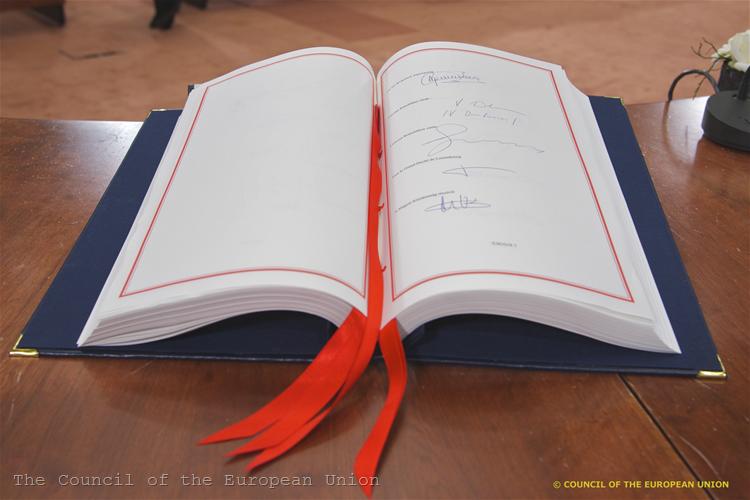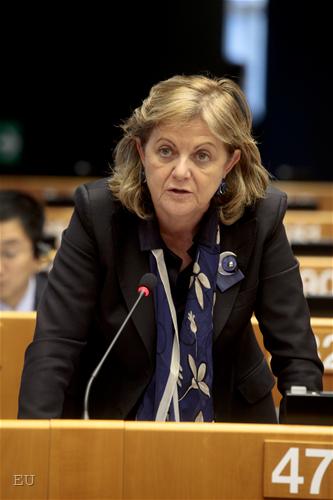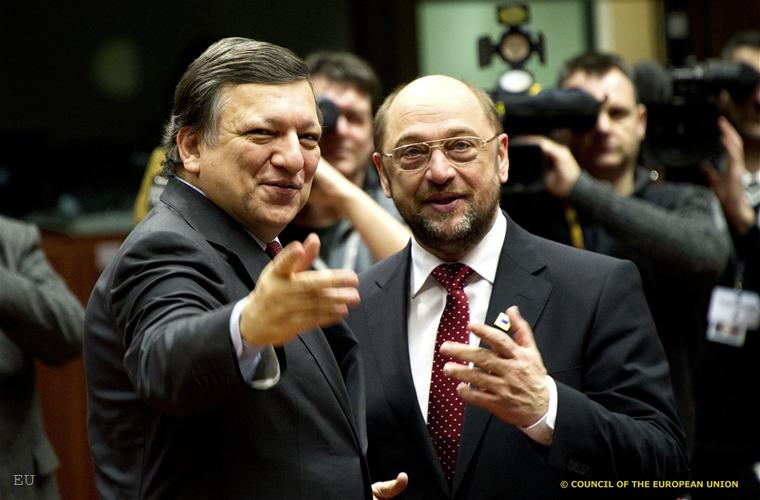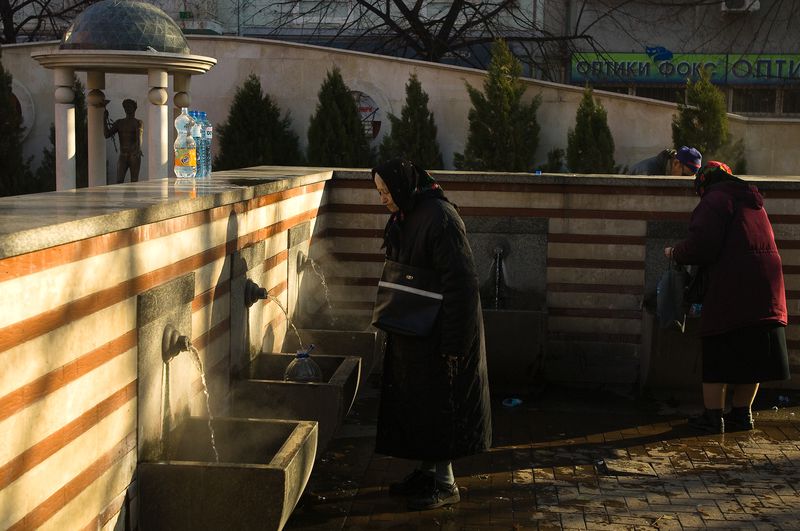On Bulgaria’s Participation in the European Fiscal Pact
Ralitsa Kovacheva, December 14, 2011
 23 EU Member States have agreed to sign a fiscal pact to boost the budgetary discipline and the economic cohesion. Actually, through changes in the EU treaties, the fiscal pact had to lay the foundation of a fiscal union in the euro area. The idea encountered strong opposition among the 10 countries that remain outside the eurozone. Firstly, the UK tried to trade its support for treaty amendments in exchange for an opt-out from the regulations in the financial sector. Then the countries with derogation (the EU Member States that are obliged by their accession treaties to adopt the euro), with Poland on the lead, demanded a place on the table by side the eurozone countries.
23 EU Member States have agreed to sign a fiscal pact to boost the budgetary discipline and the economic cohesion. Actually, through changes in the EU treaties, the fiscal pact had to lay the foundation of a fiscal union in the euro area. The idea encountered strong opposition among the 10 countries that remain outside the eurozone. Firstly, the UK tried to trade its support for treaty amendments in exchange for an opt-out from the regulations in the financial sector. Then the countries with derogation (the EU Member States that are obliged by their accession treaties to adopt the euro), with Poland on the lead, demanded a place on the table by side the eurozone countries.
Following lengthy, behind-the-scenes negotiations, diplomatic shuttles and 10-hours heartbreaking debates, in the night of 8–9 December it became clear that, because of the British veto, no treaty changes would be made. This comes to say that the fiscal pact is set to take shape in the form of an intergovernmental agreement between the countries that are willing to sign it. Up until now, those are the 23 Member States. Three others have not yet come to a decision (the Czech Republic, Sweden and Hungary). Practically, it is probable that the pact will embrace all EU Member States, except the UK.
euinside gave a detailed account and commented on the European Council decisions from the 9th of December which are, so far, the only reference document about how the main parameters of the future pact would look like. In overall, they concern the budgetary discipline, economic policy co-ordination is mentioned and suggestions are made for an amendment in the voting system on the excessive deficit procedure, when it comes to countries outside the euro area.
What was Bulgaria’s position at the European Council?
On December 5 the Bulgarian European Affairs Council (EAC) adopted a draft position for Bulgaria's participation in the European Council on December 8-9. As usually, EAC’s press release does not quote the position itself, but gives an account of the Council’s agenda. At its meeting on 7 December the Bulgarian Council of Ministers adopted the position without any comments. The deputy minister for foreign affairs, Mr Konstantin Dimitrov, who chairs EAC, explained the position on behalf of the Foreign Ministry: “Our position will be fine-tuned during the European Council, as we will have then the analysis of the proposed interim report by the European Council’s President, Mr Rompuy, and we will take into account the proposals of France and Germany concerning the economic governance, strengthening of fiscal control, harmonisation of the policies within the euro area and other elements of this complex issue.”
From the comments of Prime Minister Boyko Borissov following the European Council it turns out that Bulgaria intends to support the so called “fiscal pact”, as if the decision was self-implied. In his typical style, Mr Borissov “bulgarised” the entire idea: “I am glad that the ideas, which were already proposed by our government in Bulgaria and disputed by the opposition, became a major rule in Europe. You know for how long now we are speaking of the [Bulgarian] Financial Stability Pact, of a constitutional change, of a 3% deficit ceiling … It is currently a golden rule that is proposed to all EU Member States.”
It needs to be reminded that, actually, the “debt brake” was a German idea that emerged in the so called “Competitiveness Pact” and took shape later as Pact for the Euro+. The Bulgarian Financial Stability Pact, presented in February 2011 by Minister of Finance Simeon Dyankov proved to be no great success. The deficit rules and the re-distributive role of the state have not been introduced in the constitution but in the State Budget Structural Law, because the governing CEDB (Citizens for the European Development of Bulgaria) party did not succeed in receiving political support in Parliament. Now, however, those changes will have to be incorporated in the constitution, so that Bulgaria fulfils its fiscal pact commitments.
“I hope us to meet big support in Parliament and I hope that in Parliament the opposition will vote for this pact because it guarantees that – even in case that the electorate slips down and votes for populists or nationalists – the constitution will prevent anything bad to happen in the country”, Mr Borissov commented after the European Council on 9 December.
Can we expect, however, the parties in Parliament to change their positions? Understandably, the Bulgarian Socialist Party (BSP) and the Movement for Rights and Freedom (MRF) are against the proposal and they will continue to oppose it. The rightist Union of Democratic Forces (UDF) supported Djankov’s proposal but the other rightist party – Democrats for Strong Bulgaria (DSB) - did not, with the argument that it did not agree with the third element of the pact – the proposal to vote for tax changes with a 2/3 majority of all MPs. This time the dark-blues (DSB) welcomed the “Brussels agreement for introduction of strong rules against the budgetary deficits in the EU Member States”, which, however, does not implore their support for the government’s proposal in its current form.
Overall, the idea for an EU rule on the balance in the national budgets meets less opposition in Bulgaria than some of the other ideas which may be included in the fiscal pact. The usual criticism of the economists and analysts is linked to the probability for tax rises, as a result from the commitment, as explained in President Herman van Rompuy's report, for a stronger co-ordination in the field of taxes, and the social and pension insurance systems.
Maybe, the most discussed issue linked to the new fiscal pact in the Bulgarian media seems to be the commitment for additional 200 billion euro for IMF. The exact wording in the euro area heads’ statement is: “euro area and other Member States will consider, and confirm within 10 days, the provision of additional resources for the IMF of up to EUR 200 billion (USD 270 billion), in the form of bilateral loans”. The PM’s statement in Brussels did not help in revealing Bulgaria’s opinion on the issue, because, in fact, he replied to a wrong media question – instead about the IMF, the question referred to the rescue fund:
“- The euro area countries and other Member States have to collect EUR 200 billion for the rescue fund. Is Bulgaria obliged to participate in this action?
- No. Currently we do not participate.”
The Ministry of Finance did not contribute to clear up the picture not only on this matter but on Bulgaria’s commitments under the fiscal pact at large. euinside already wrote how, instead of a replying to our interview request, the institution announced it was in a “media break”.
Actually, we should not wonder about the lack of informed debates on the topic. Once again, we see the situation with the “Euro+” pact repeating, with the only difference that 8 months ago the topic was more prominent in the media and now they are more focused on the deepening of the crisis. Under the current circumstances, the obscurity about the position, championed by Bulgaria in the course of the last months, was not particularly helpful. In this period, the strengthening of the euro area integration and the consequences for the entire EU was actively on the table.
We did not learn, for instance, whether Bulgaria was in the Polish camp among the countries that were actively lobbying against an EU division to the euro area and the rest. We did not officially hear from the government the discussed solutions or Bulgaria’s opinion on them. The financial minister spoke about future fiscal unions that were to be formed entirely outside the existing framework (Germany, France, Finland, the Netherlands, Luxembourg and Austria plus Bulgaria and Sweden). Just days before the European Council he predicted a 60% probability for a break-up of the eurozone – something inadmissible for a finance minister of an EU country. In fact, the financial minister’s disinterest in European affairs is long since known. Mr Djankov usually sends to the ECOFIN councils his deputy - Boryana Pencheva.  By the way, it is significant that in the Council’s picture library there is only one picture listed for Mr Djankov, but the person in the close-up is not him (see to the right).
By the way, it is significant that in the Council’s picture library there is only one picture listed for Mr Djankov, but the person in the close-up is not him (see to the right).
The reactions at home
Against this background, it is simply amazing that post factum, just after the announcement about the European Council decisions and Bulgarian participation, the party and other national leaders suddenly woke up for the need of a Bulgarian position on the matter. Georgi Parvanov, the president, rushed to comment on the fixing of the Financial Stability Pact in the constitution, saying that “in this case the doubt remains that we should not bid on decisions that to such an extent could tie the hands of future governments and to deprive them of the ability to implement an effective economic policy to the end of shortening the distance between us and the rest of the European economies”. This is a par excellence opposition to the taken decisions.
DSB produced a statement on the euro crisis that, referring to the fiscal pact, says: “The negotiations for agreement between the EU countries are forthcoming. Therefore, we insist that the Bulgarian government must start a debate to formulate a nationally responsible Bulgarian position for the actual negotiations.” DSB declares itself ready to participate in debates, “aimed at seeking a broad political and national consensus, invoked to prevent the risk of spreading the euro crisis to the monetary board in Bulgaria and the country’s financial system.”
UDF leader Martin Dimitrov commented for the national radio (as quoted by Dnevnik): “We support the idea for a financial pact but we are categorically against the ideas of the French government for tax unification. We are against the ideas that provide for the bigger countries to decide on behalf of the small ones. We are against the loss of sovereignty.” Mr Dimitrov expressed a similar position at the discussion organised by euinside in July on EU economic governance.
The newly elected chairman of the Party of the European Socialists (PSE) and leader of the Bulgarian Socialist Party, Sergey Stanishev, stayed loyal to the PSE line, by criticising in principle the leaders’ approach. Just as President Parvanov, he believes that a wider public discussion on the topic has to take place in Bulgaria.
Well, you should have initiated such a discussion, gentlemen! Between October and December the Bulgarian Parliament had only twice expressed interest in topics related to the situation in the EU (besides European structural funds): on 2 December MP Cornelia Ninova (BSP) asked a parliamentary question about the eurozone crisis and the reaction of Bulgaria as presented by the financial minister Simeon Djankov; on 7 October PM Boyko Borissov presented a written answer to MP Georgi Pirinsky (BSP, again) about the government’s position on the proposal for strengthening the eurozone economic governance and the effects on Bulgaria. Those two cases did not incite fervent public discussions. It is just another case of using EU topics for internal political propaganda, which does not mean that those topics have entered the agendas of the political parties. In most of the media the situation is similar.
But even if permanently late, public debates on the topic would have been extremely useful in Bulgaria because the society has the right to know what happens in Europe and why and what is Bulgaria’s role in it. Because, only if there is sufficient information and the citizens can make their own assessment of it, they shall be able to assess the positions of those who have been entrusted with their vote. Finally, because it all lies back to our - the taxpayers’ - votes and money.
As for the fiscal pact itself, with regard to all the above circumstances, it could only be good news for Bulgaria as it provides for the important decisions on budgetary and economic policies to be taken at EU level. This is the only guarantee that our national interests will not fall victim to national political intrigues, national incompetence and national complexes.
 | © The Council of the European Union
| © The Council of the European Union | © European Union
| © European Union | © euinside
| © euinside | © EU
| © EU | © EU
| © EU | © EU
| © EU | © euinside
| © euinside